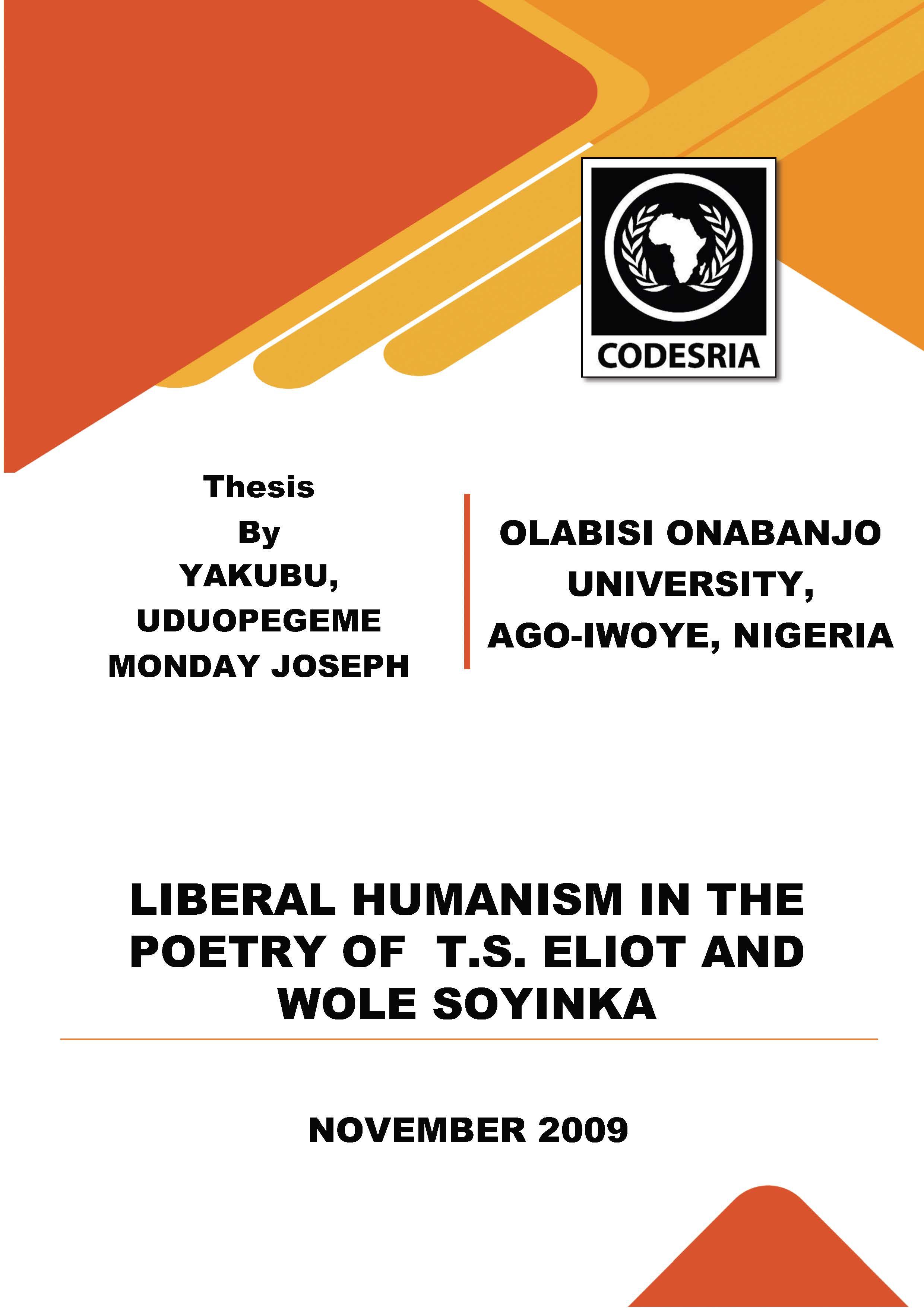LIBERAL HUMANISM IN THE POETRY OF T.S. ELIOT AND WOLE SOYINKA
Mots-clés :
Criticism, Dialectics, Humanism, Liberalism, PoetrySynopsis
T.S. Eliot and Wole Soyinka are modem writers whose literary works share what several Western and African critics consider as obscure writing and controversial social visions. Also, both writers have been described as liberal humanists, though there is a
paucity of scholarly works in terms of an elaborate and systematic analysis of their art in the context of the theory and practice of liberal humanism. This study attempts to answer some of these questions about the two writers through a theoretical exploration of their poetry drawing upon the critical appliances of liberal humanism, which offers itself as the major ideological plank upon which the works of the writers are established. It explores the nature and elements of liberal humanism in the poetry of Eliot and Soyinka; it illustrates how their literary practice mirrors the essence of this humanism as a philosophical experience and a historical criticism of their societies; it identifies and explores differences in their liberal humanism; and it relates their liberal humanist assumptions and practices to contemporary social experiences in the West and in Africa.
It elaborately examines the idea of liberal humanism in its attempt to achieve the broad objective of a thorough ideological classification of the poetry of Eliot and Soyinka. This work draws upon four tools of literary criticism: practical criticism, comparative criticism, cross-disciplinary approach, and deconstructive criticism. It uses the close reading strategy of practical criticism to decode the nature and essence of liberal humanism in the poetry of Eliot and Soyinka. It employs comparative analysis to establish the similarities and differences in the works of the two poets. It adopts a crossdisciplinary approach to the knowledge of liberal humanism to give the study a comprehensive focus in terms of relevance to global human and societal development.
Through the deconstructive technique, the study vividly illustrates the limits and ambivalences of the humanist imagination in the two writers. The study substantially draws on recent theory and criticism and is, accordingly, fairly speculative. The study contributes to the existing body of critical knowledge ofT.S. Eliot and Wole Soyinka as major liberal humanist writers by providing new insights into the workings of, and contradictions in, liberal humanism as represented in their poetry. It reveals that the nature and demonstration of the humanist influence on their poetry are essentially enigmatic and dialectical. Their works encapsulate commitment to the free spirit of tradition, as they strive to achieve poetic balance between humans as individuals and the communitarian essence of society.
The two writers share the ethos of humanistic writing in the contexts of classical, religious, cultural and pluralist thinking and practice. These contexts significantly impact upon the various characteristics of language that shape their works. Importantly, the study illustrates critical similarities and differences not only in the works of the two writers, but also in the context of the respective locales of the contemporary human and societal experiences that they represent.
Téléchargements
Références
Achebe, Chinua. (1958). Things Fall Apart. London: Heinemann.
Ackennan, Bruce. (1980). Social Justice in the Liberal State. New Haven: Yale UP.
Ade-Ajayi, J.F. (1960). 'Nineteenth Century Origins of Nigerian Nationalism'. Journal of the Historical Society of Nigeria, 2: 196-210 .
Adelugba, Dapo, ed. (1987). Before Our Very Eyes: Tribute to Wole Soyinkn. lbadan: Spectrum Books.
Agetua, John, ed. ( 1975). When the Man Died: Views, Reviews, Interviews on Wole Soyinka 's Controversial Book. Benin City: Midwest Newspapers Corporation.
Amuta, Chidi. (Spring 1988). 'The Ideological Content ofWole Soyinka's War Writings'. Commomvealth, 8.2:102-12.
Aristophanes. (411 B.C., [1988]). Lysistrata. In Jordan Miller, ed The Heath Introduction to Drama. 4th Edition. Lexington, Massachusettsfforonto: D.C. Heath Company. 79-128.
Arnold, Matthew. (1954). "The Function of Criticism." In Arnold: Poetry and Prose John Bryson, ed. London: Rupert Hart-Davis.
Arnold, Matthew. (1956). 'Dover Beach'. John Hayward, ed. The Penguin Book of English Verse. Hannodsworth, Middlesex: Penguin Books. 344-345.
Aronowitz, Stanley. ( 1994). Dead Artists, Live Theories and Other Cultural Problems. New York and London: Routledge.
Awolalu, J.Omosade. (1979). Yoniba Beliefs and Sacrificial Rites. London: Longman.
Aynndcle, E.A. (1966). The Missionary Impact on Modern Nigeria: 1842-/914. London: Longman Group Ltd
Babbit, Irving. ( 1908). Literature and the American College: Essays in Defence of the Humanities. Houghton: Miffiin.






